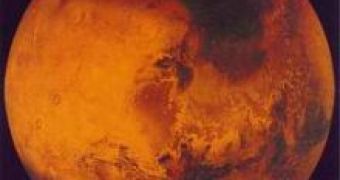It may be difficult for two people to have a conversation on Mars, according to a research paper by Penn State graduate student in acoustics Amanda Hanford and Lyle Long, professor of aerospace engineering.
"Sound doesn't travel very far on Mars", explained Hanford, an acoustics doctoral degree candidate. Using a direct simulation Monte Carlo (DSMC) method, Hanford and Long took into account the Martian atmospheric composition, as well as the lower atmospheric pressure of Mars and temperature differences. The simulation predicted that sound on Mars has a lower pitch and very short distance.
She said a sound's lower pitch is the result of the differences in the speed of sound. This is because of the Red Planet's atmospheric makeup - mostly carbon dioxide, with small percentages of nitrogen and argon with trace amounts of water vapor and oxygen.
"When you breathe in a helium balloon and speak, your voice is a high pitch", Hanford explained. "Assuming you could breathe in carbon dioxide (which is very toxic), your voice would be a lower pitch."
"The lower pressure makes it so sound doesn't travel far", she explained. According to the paper, sound generated by a human scream on Earth can travel a little over a kilometer before being absorbed by the atmosphere. On Mars, the sound from that same scream would only move about 15 meters at best.
She describes the conditions on Mars: "To know how sound propagated on Mars, we need to know a little bit about the atmosphere in which the sound propagates, since acoustics is a fluid dynamic process. The molecular composition of the Martian atmosphere differs greatly from that on Earth with 95.3% of the atmosphere being carbon dioxide, as opposed to trace amounts of carbon dioxide on Earth. The other constituents of the Martian atmosphere include 2.7% Nitrogen, and 1.6% Argon, with trace amounts of Water vapor and Oxygen".
"As well as having a different molecular composition, Mars' atmosphere is also much thinner than Earth's. Earth's atmosphere is about 3 km thick, while Mars' is very thin and transparent. The pressure of the surface of Mars is only about 0.7% (about 700 Pa) of that on Earth at sea level (about 101,000 Pa), but it also changes significantly due to the seasons. In winter some of the atmosphere's Carbon Dioxide freezes which then snows on the polar caps. The surface pressure also varies greatly throughout the planet, which is enough to support large winds that can create planet-wide dust storms that can last many months. Also, the temperature on Mars is cooler than Earth, ranging from 200 K to 300 K."
The last attempt to record sound on Mars was part of the NASA's Mars Polar Lander, launched in January 1999. The probe included a miniature microphone to record sounds on the Martian surface. Communication with the lander was lost after it entered the Martian atmosphere on Dec. 3, 1999. Hanford hopes that the next missions on Mars will also include acoustic experiments.

 14 DAY TRIAL //
14 DAY TRIAL //